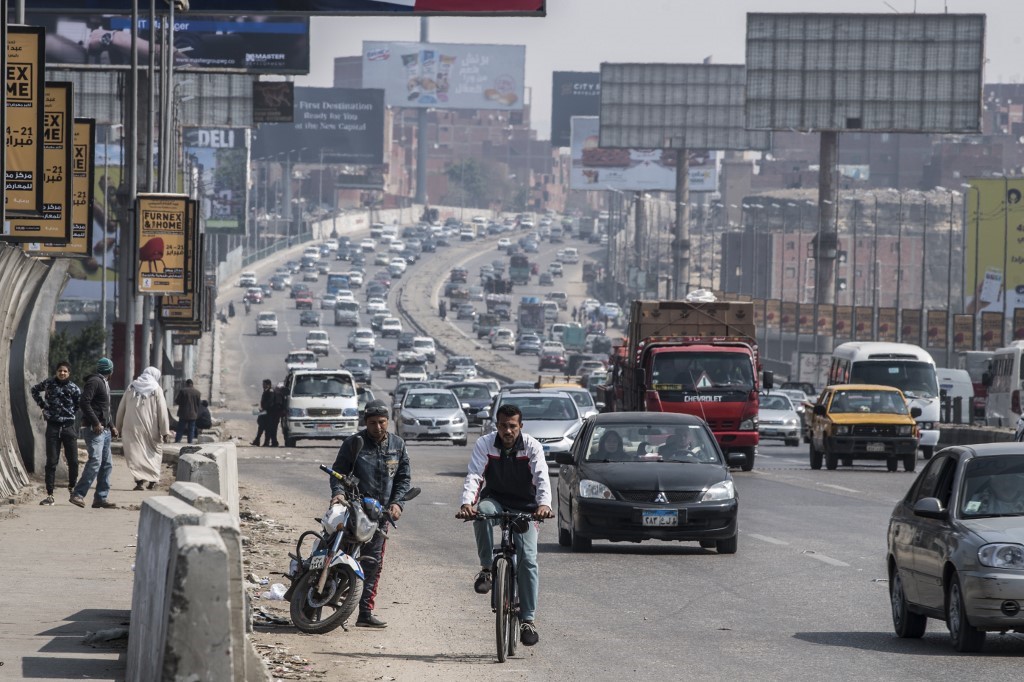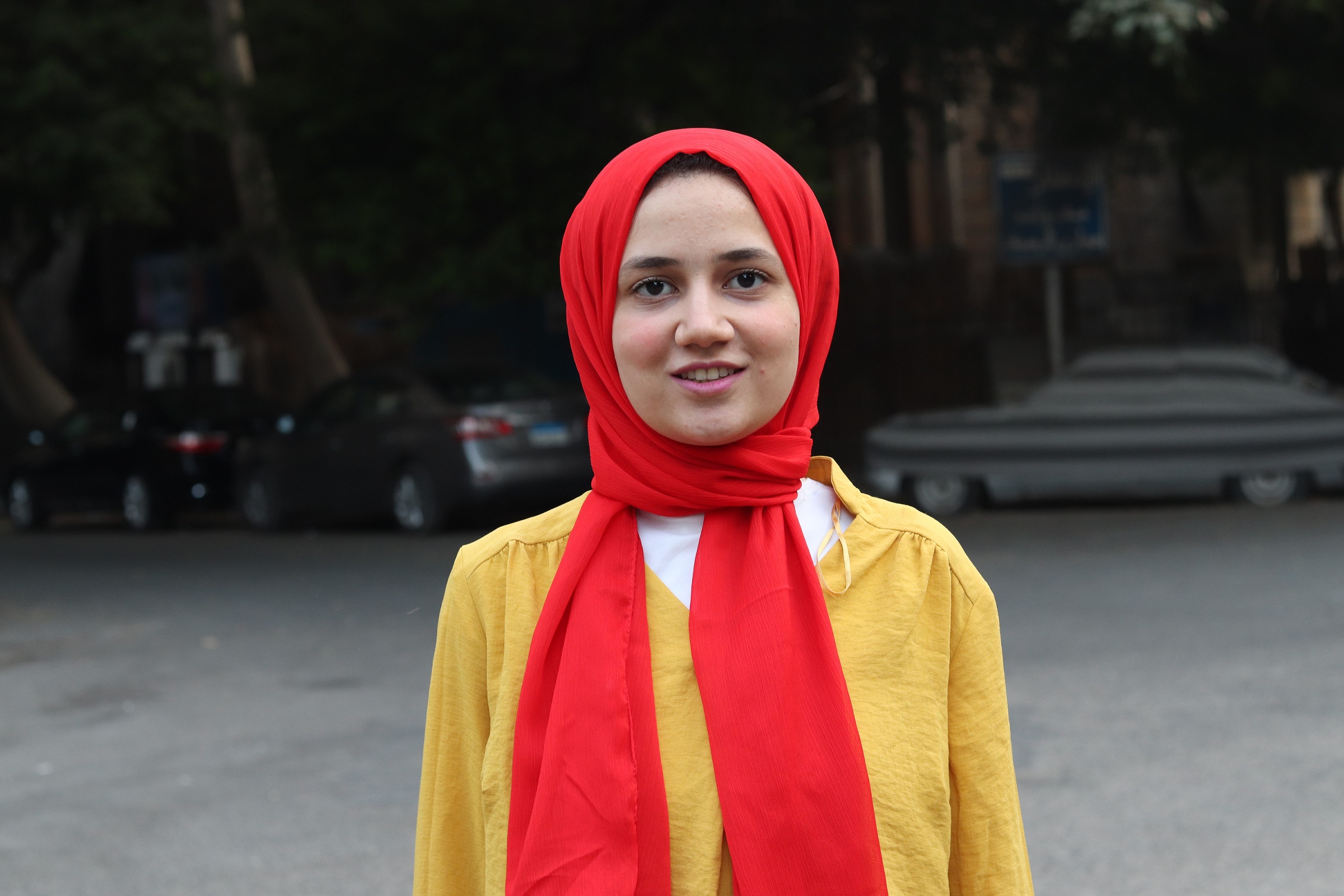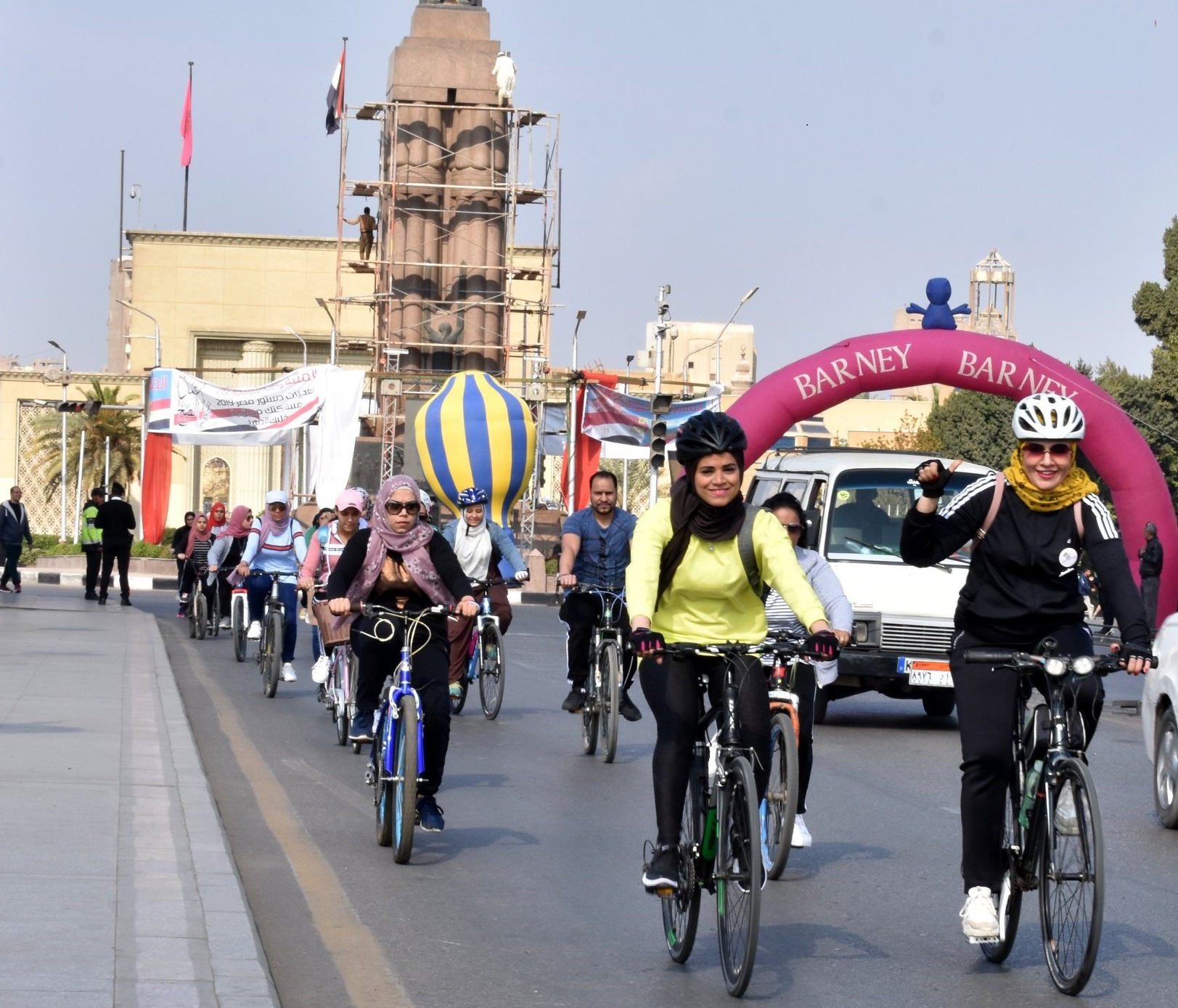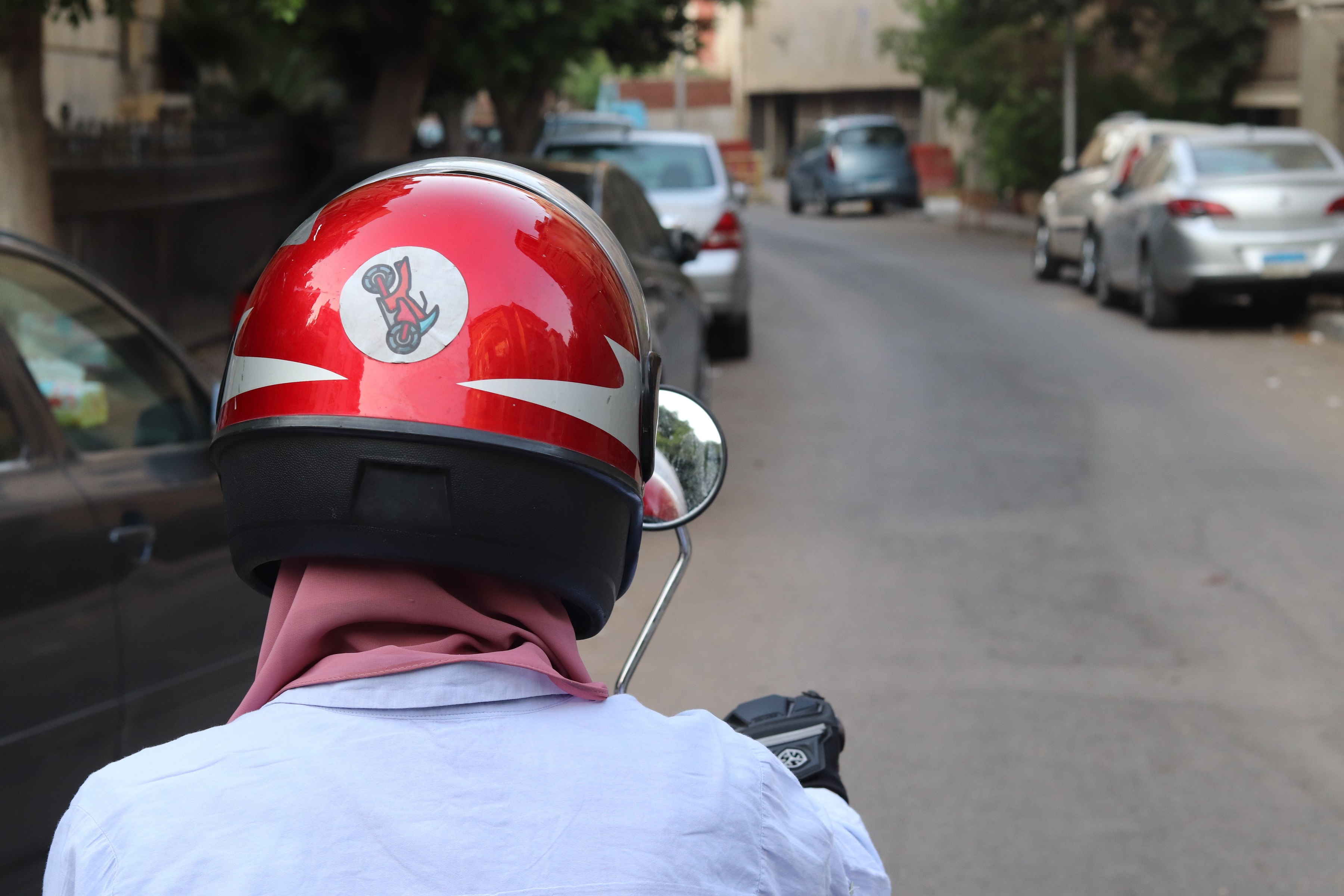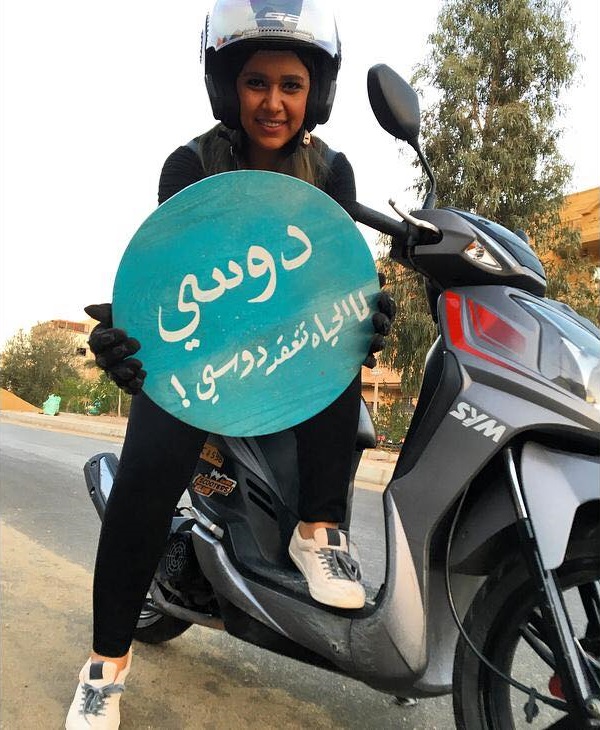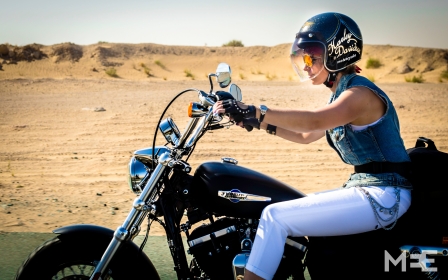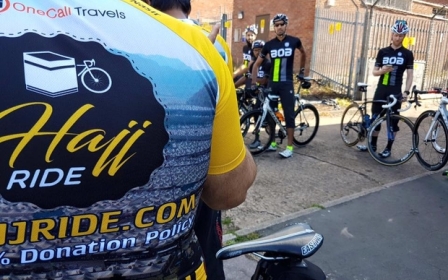Egypt's easy riders: How scooter sisters are taking back the road
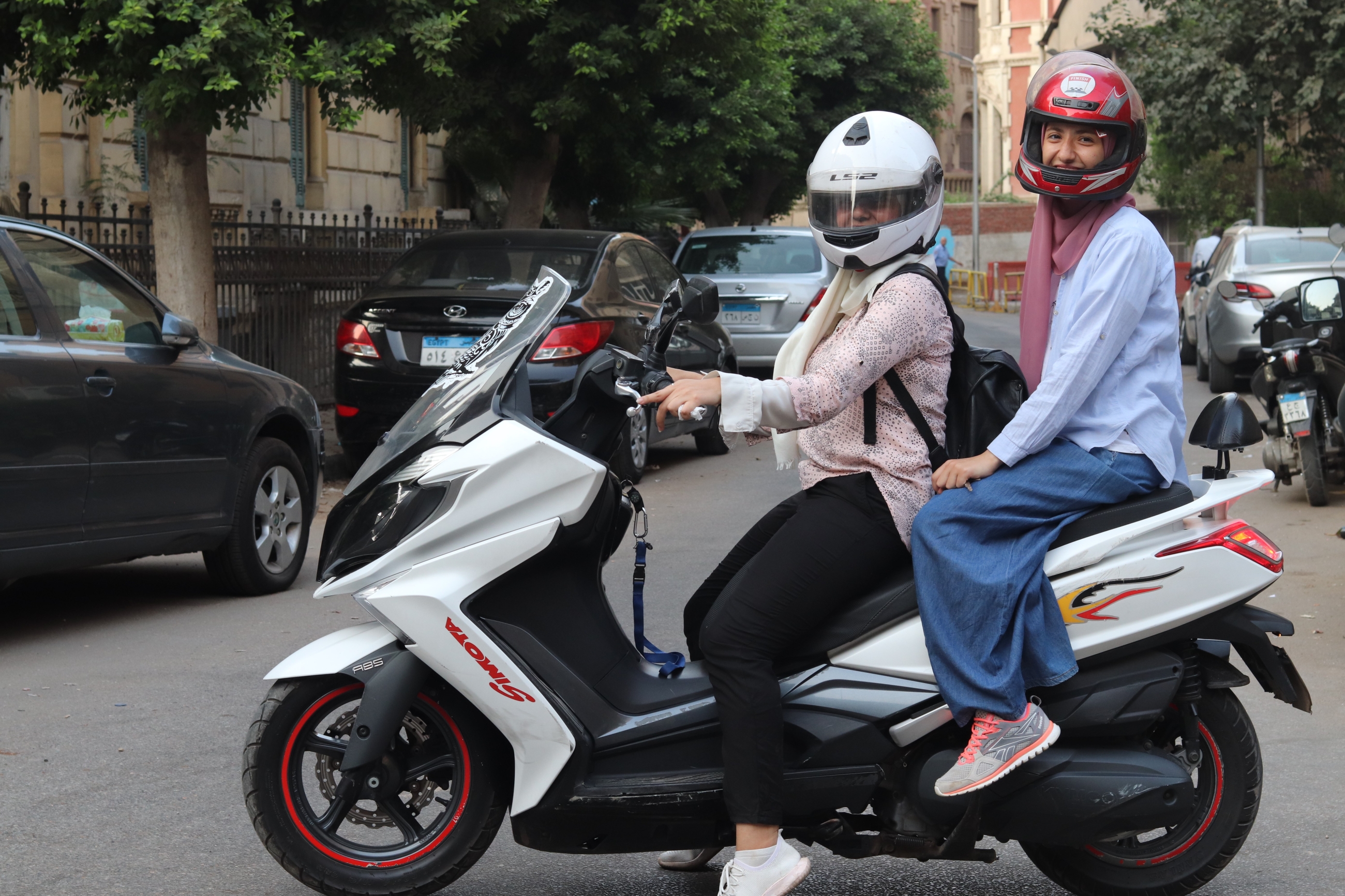
When Hoda Gamal rides her scooter, she says there is no better feeling in the world. “It’s the best moment in life for me, like total freedom. All the wind is inside me, I can breathe, as if I am walking along the ocean shore,” she tells MEE.
Sometimes Gamal's friends call her for a ride, and she especially likes picking them up when they're far away. Her first stop is the petrol station, where she goes to change the oil and fill up her tank. On unfamiliar routes, she pays extra attention to potholes, but rarely faces any obstacles.
Gamal, a scooter instructor, is one of Egypt’s new generation of female bikers, challenging a trend that has seen most women excluded from two-wheel transport amid congestion and societal disapproval.
Through the 1970s and into the mid-80s, many women and girls rode around Cairo on a bicycle. Yet, in recent years, this tradition has dwindled as Egypt’s polluted streets became congested with cars, motorcycles and scooters driven primarily by men.
New MEE newsletter: Jerusalem Dispatch
Sign up to get the latest insights and analysis on Israel-Palestine, alongside Turkey Unpacked and other MEE newsletters
Golden age of cycling
Heba Salem, a senior Arabic language instructor at the American University in Cairo, recalls growing up when it was safe to ride a bike in the city, and almost everyone did.
“As a kid, in Maadi, the neighbourhood I lived in, I used to ride a bicycle everywhere. My mum did all her errands with a bicycle. There was not really the concept of even driving a car, everything was by bike,” Salem tells MEE.
Through the 1970s and into the mid-80s, many women and girls rode around Cairo on a bicycle. Yet, in recent years, this tradition has dwindled
“But now, because of the high traffic, I never see bikes and I feel concerned for those who try to ride scooters, especially since so few wear helmets and because they try so desperately to bypass traffic by riding between the most narrow cracks.”
Ghada Abo El-Kassem, a secretary at a real estate company, says she has a car, but would prefer to ride a scooter because it would save a lot of time and fuel money. Yet, there are several factors preventing her.
“I think subconsciously I have not bought a scooter because it’s not fully accepted in our society for a girl to do this and it might be difficult to convince my family. So I plan on first training how to ride a scooter, before I take the decision to talk to them.
“I hope one day the idea spreads so it is just as normal for a girl to drive a scooter as a guy, without receiving strange looks.”
Crossing the megacity
Cairo is the largest city in Africa and the Arab world, a megacity with a rapidly growing population struggling with inadequate transport infrastructure.
Menna and Nouran Farouk also wanted to learn how to ride scooters in Cairo after becoming fed up of being stuck in the city’s notorious traffic jams behind the wheel of their car.
“My sister and I were looking for an instructor to teach us how to ride bicycles and scooters, but we could not find an academy close by,” says Menna. “So, we thought about launching a startup that can provide female instructors for women and girls in Egypt in their areas and at times convenient for them.”
This thought turned into reality and the sisters started Dosy, a digital service linking women who want to learn to ride scooters with suitable instructors, like Gamal.
“Dosy” is a play on words, meaning “take the risk” in colloquial Egyptian Arabic and “step,” as in "step on the breaks", in classical Arabic.
Menna, 27, a masters student at the American University in Cairo, majoring in television and digital journalism, runs things behind the scenes, bringing experience from previous work with startups focused on women’s empowerment.
Before Dosy, in 2015, she worked for Direxiona, Egypt’s first online platform for female driving instructors, and Eksabiha, an online startup which helps women launch their own arts and crafts business.
Nouran, 25, who studies Human Medicine at the University of Ain Shams, is the content writer and runs the social media accounts.
Starting the start-up
In April, the sisters launched their startup on Facebook, posting an advertisement for female scooter instructors to apply.
Currently, they have five instructors covering all of Cairo. This month they will launch in the Mediterranean port city of Alexandria.
They have now trained more than 15 women and 200 women have registered with them to learn how to ride scooters.
Dosy sees safety and proper training as a top priority: all its instructors have to sign a contract that says they will wear and provide necessary gear including pads, gloves and a helmet.
Recognising that not everyone can afford a scooter or motorbike, they are also training girls how to ride bicycles. According to Mona, it generally costs 900 Egyptian pounds ($55) for a pedal bike, whereas the cheapest new scooter costs EGP18,000 ($1,090) and a used one is about EGP10,000 ($600).
Dosy’s packages start at EGP800 ($48) for four classes.
Pedal power
Dosy was not the first start-up to realise there was a gap in the market for helping Egyptian women who want to learn how to get around on two wheels.
She Can Ride was founded in July 2018 and, akin to Dosy, caters solely for females but instead focuses on training them how to ride pedal bikes. “We have trained 800 girls ranging from age 20 to 76,” founder Sara Gamal tells MEE. The group has three branches: in Cairo, Giza and Alexandria.
“We also teach them how to repair their bicycles and also how to be able to ride long distances like 40 or 60 kilometers,” she says, adding that most girls end up wanting to at least think about learning how to ride a motorcycle. "This is why our idea could segue into Dosy," Gamal says.
The cost of transport in Egypt has been rising steadily since President Abdel Fattah el-Sisi took power in 2014. In response, the president has repeatedly supported cycling as a healthy, cheaper transport option for Egyptians.
On 5 July this year, fuel prices increased again by up to 30 percent in the latest round of subsidy cuts imposed as part of the IMF loan deal with Egypt, the fifth increase in prices since 2014.
Dosy reports an increasing number of new clients who want to ride scooters as a cheaper alternative to driving cars and a way of reducing the impact of rising fuel prices.
'Their clothing could be revealing'
But some conservative voices in society still do not view riding a bike as appropriate for women. “I do not think women should be riding scooters because their clothing could be revealing when riding,” said Sulemain Mahlawi, a security guard at an apartment building in the wealthy Cairo neighbourhood Garden City.
The 2015 Global Gender Gap Index, which measures disparities between men and women across countries, ranks Egypt at 136 out of 145 countries worldwide.
“This is a problem in our society when a woman tries to work in any field that is traditionally male dominated, but we have received a lot of support from men as well," Dosy co-founder Nouran Farouk told MEE.
Esraa Ahmed, who studies Islamic Law at Azhar University, bought a package of four classes from Dosy to learn how to ride a scooter. For her, there's nothing in Islam that would prevent a woman from riding a scooter.
“My family was just a bit worried for my safety from an accident, but now they are appeased.”
Nihad Abu'l Qamsan, an Egyptian activist and president of the Egyptian Centre for Women’s Rights, says that Egyptian society is definitely ready for this initiative.
“I believe our society is progressive and not as fundamentalist as people think. The society stands strongly with women when we see sexual harassment cases. Of course, we have conservative voices but it is not mission impossible,” she said.
'I have seen women riding scooters in middle and upper class neighbourhoods where the roads are nicely paved but for this to truly spread, they will need to reach everywhere
- Nihad Abu'l Qamsan, an Egyptian activist
According to Qamsan, riding a scooter is not dangerous because it does not go at high speeds. Above all, “it delivers a message of freedom. It shouts: we have our tools and we won’t have to rely on anyone else.”
For Qamsam, Dosy needs to tackle a class issue. “I have seen women riding scooters in middle and upper-class neighbourhoods where the roads are nicely paved but for this to truly spread, they will need to reach everywhere.
“They need to get authorities on board to implement stricter traffic rules and re-plan the streets for scooters and bicycles or they will become disappointed soon.”
The sisters believe not only will their initiative empower women, but it will also mitigate the problems of sexual harassment that women and girls otherwise might encounter while using public transportation, such as the metro system and riding crowded buses.
Alexandria’s Iron Woman
If anyone can claim to have pioneered this relatively new phenomenon of female scooter riding in Egypt, it is Sally El-Gindy, of Alexandria.
El-Gindy, who is known by the nickname of “Iron Woman”, is one of the founders of the Alexandria Scooter Riders, the first mixed-gender biker academy in Egypt.
The organisation has trained over 500 men and women to date. Then, in 2015, she independently founded “Two Wheels Academy,” the first academy in Egypt teaching solely girls how to ride scooters.
The group gathers female motorcyclists every Friday in front of Alexandria’s national library, one of the most important libraries of the ancient world, to ride around the coastal city.
Her group used to receive strange looks from passersby but now many are accustomed to their presence. They post videos on Facebook to raise awareness and show how putting on helmets, gloves, knee and elbow pads can protect riders from dangers associated with motorcycles.
Dosy’s founders became aware of Gindy’s efforts in Alexandria when they were contacted by female bikers from the city.
“When we received a lot of requests in Alexandria, we immediately looked into it and thought to reach out to two of the most talented female drivers there: Sally El-Gindy and Merihan Gaber,” says Menna Farouk.
“The city is a bit smaller and easier to use scooters for errands and transport for jobs, which makes it an ideal location,” she adds.
In the next month, El-Gindy and Gaber plan to sign a contract with Dosy to train their clients based in Alexandria.
Dosy hopes to coalesce all existing initiatives under their umbrella organization for women who want to ride scooters. However, many groups want to stay independent, including El-Gindy’s “Two Wheels Academy”.
“Dosy operates as a quasi-consulting business. I personally do not care about money,” says El-Gindy, speaking to MEE. “Despite me having an academy with well-trained staff, I haven’t made money in two years from my job,” she said.
“I am happy to help and train people they bring to me, but my organisation will never become Dosy.”
Where the women come together is in their shared vision to encourage females to take on the responsibility of riding a scooter to normalise it throughout society.
Dosy’s promotional activities have seen it appear on Egyptian national television, including on an influential television talk show with the well-known broadcaster Sally Fouad.
They have contacted actors, singers and social media influencers to ask them to back the initiative, including the popular singer, Sandy, who has used the service.
Saif al-Masry, a lawyer and actor famous for his humorous video clips, has promoted Dosy on his Instagram account. Talking to Middle East Eye, al-Masry says: “I really support this organisation because in a way it is advancing women's rights and pushing for equality.”
In the future, the startup also hopes to use instructors in a food delivery operation and also as a taxi service like Uber and Careem, focused on scooters solely for women.
The biggest problem for female riders according to Gamal was the attitude of a few conservative men, but she feels that this issue is being resolved. “When people see me on a scooter rarely anyone remarks. It’s clear that our society is changing for the better, maybe thanks to social media and awareness campaigns.”
She says that it would be best for everyone to ride a scooter, not just for economic and traffic reasons, but also for psychological wellbeing.
“On the way back home from rides, when the tank is running low, I feel like I have taken my part of happiness for the day. When I leave my scooter in the garage, I already feel like I want to rest a bit and then get up and ride again.”
Middle East Eye delivers independent and unrivalled coverage and analysis of the Middle East, North Africa and beyond. To learn more about republishing this content and the associated fees, please fill out this form. More about MEE can be found here.


